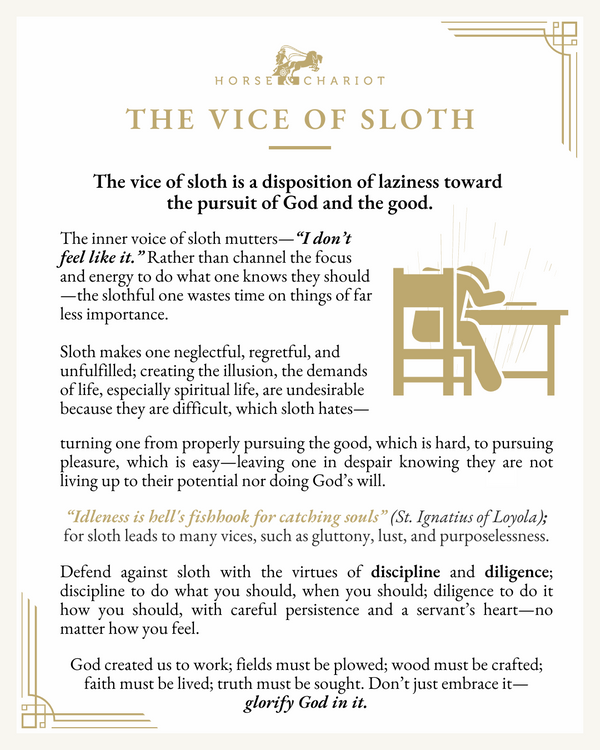All Series > Seven Chiefly Vices > Part 4
The Vice of Sloth
Teaching of Virtue
Watch: On YouTube
The Vice of Sloth
The sin not just of idleness of body, but sluggishness of soul—is sloth.
The vice of sloth is a disposition of laziness toward the pursuit of God and the good.
The inner voice of sloth mutters—“I don’t feel like it.” Rather than channel the focus and energy to do what one knows they should—the slothful one wastes time on things of far less importance.
Sloth makes one neglectful, regretful, and unfulfilled; creating the illusion, the demands of life, especially spiritual life, are undesirable because they are difficult, which sloth hates—turning one from properly pursuing the good, which is hard, to pursuing pleasure, which is easy—leaving one in despair knowing they are not living up to their potential nor doing God’s will.
“Idleness is hell's fishhook for catching souls” (St. Ignatius of Loyola); for sloth leads to many other vices, such as gluttony, lust, and purposelessness.
Defend against sloth with the virtues of discipline and diligence; discipline to do what you should, when you should; diligence to do it how you should, with careful persistence and a servant’s heart—no matter how you feel. Noting, “...discipline always seems painful rather than pleasant at the time, but later it yields the peaceful fruit of righteousness to those who have been trained by it” (Hebrews 12:11).
God created us to work; fields must be plowed; wood must be crafted; faith must be lived; truth must be sought. Don’t just embrace it—glorify God in it.

Scroll down for the related scriptures, quotes, and lesson plan associated with this teaching.
Copyright © 2022 Horse & Chariot. All rights reserved.
Visual Resource

Related Scripture
“Now, discipline always seems painful rather than pleasant at the time, but later it yields the peaceful fruit of righteousness to those who have been trained by it.” — Hebrews 12:11 (NRSV-CE)
“Our friends, we command you in the name of our Lord Jesus Christ to keep away from all believers who are living a lazy life and who do not follow the instructions that we gave them. You yourselves know very well that you should do just what we did. We were not lazy when we were with you. We did not accept anyone's support without paying for it. Instead, we worked and toiled; we kept working day and night so as not to be an expense to any of you. We did this, not because we do not have the right to demand our support; we did it to be an example for you to follow. While we were with you, we used to tell you, ‘Whoever refuses to work is not allowed to eat.’ We say this because we hear that there are some people among you who live lazy lives and who do nothing except meddle in other people's business. In the name of the Lord Jesus Christ we command these people and warn them to lead orderly lives and work to earn their own living.” — 2 Thessalonians 3:6-12 (GNT)
“No matter how much a lazy person may want something, he will never get it. A hard worker will get everything he wants.” — Proverbs 13:4 (GNT)
“How long is the lazy man going to lie around? When is he ever going to get up? ‘I'll just take a short nap,’ he says; ‘I'll fold my hands and rest a while.’ But while he sleeps, poverty will attack him like an armed robber.” — Proverbs 6:9-11 (GNT)
“Laziness brings on deep sleep; an idle person will suffer hunger.” — Proverbs 19:15 (NRSV-CE)
"Woe to timid hearts and to slack hands, and to the sinner who walks a double path!" — Sirach 2:12 (NRSV-CE)
“For in pride there is ruin and great confusion. And in idleness there is loss and dire poverty, because idleness is the mother of famine.” — Tobit 4:13 (NRSV-CE)
“She looks well to the ways of her household, and does not eat the bread of idleness.” — Proverbs 31:27 (NRSV-CE)
“The lazy do not roast their game, but the diligent obtain precious wealth.” — Proverbs 12:27 (NRSV-CE)
“The appetite of the lazy craves, and gets nothing, while the appetite of the diligent is richly supplied.” — Proverbs 13:4 (NRSV-CE)
“As a door turns on its hinges, so does a lazy person in bed.” — Proverbs 26:14 (NRSV-CE)
“The way of the lazy is overgrown with thorns, but the path of the upright is a level highway.” — Proverbs 15:19 (NRSV-CE)
“In the morning sow your seed, and at evening do not let your hands be idle; for you do not know which will prosper, this or that, or whether both alike will be good.” — Ecclesiastes 11:6 (NRSV-CE)
“The idler is like a filthy stone, and every one hisses at his disgrace. The idler is like the filth of dunghills; anyone that picks it up will shake it off his hand.” — Sirach 22:1-2 (NRSV-CE)
“...idleness teaches much evil.” — Sirach 33:29 (NRSV-CE)
“Do not consult with a woman about her rival or with a coward about war, with a merchant about business or with a buyer about selling, with a miser about generosity or with the merciless about kindness, with an idler about any work or with a seasonal laborer about completing his work, with a lazy servant about a big task—pay no attention to any advice they give.” — Sirach 37:11 (NRSV-CE)
“And we urge you, beloved, to admonish the idlers, encourage the fainthearted, help the weak, be patient with all of them.” — 1 Thessalonians 5:14 (NRSV-CE)
“Besides that, they learn to be idle, gadding about from house to house; and they are not merely idle, but also gossips and busybodies, saying what they should not say.” — 1 Timothy 5:13 (NRSV-CE)
“When you are too lazy to repair your roof, it will leak, and the house will fall in.” — Ecclesiastes 10:18 (GNT)
“Whatever you do, work at it with all your heart, as though you were working for the Lord and not for people.” — Colossians 3:23 (GNT)
“Work hard and do not be lazy. Serve the Lord with a heart full of devotion.” — Romans 12:11 (GNT)
Related Quotes
“Idleness is hell's fishhook for catching souls.” — St. Ignatius of Loyola
“From exertion come wisdom and purity; from sloth ignorance and sensuality.” — Henry David Thoreau
“Sloth is sluggishness of the mind which neglects to begin good...it is evil in its effect, if it so oppresses man as to draw him away entirely from good deeds.” — St. Thomas Aquinas
“Diligence overcomes difficulties; sloth makes them.” — Benjamin Franklin
“Sloth, like rust, consumes faster than labor wears, while the used key is always bright.” — Benjamin Franklin
“Flee sloth; for the indolence of the soul is the decay of the body.” — Cato the Younger
“Sloth, if it has prevented many crimes, has also smothered many virtues.” — Charles Caleb Colton
“Sloth is the desire for ease, even at the expense of doing the known will of God. Whatever we do in life requires effort. Everything we do is to be a means of salvation. The slothful person is unwilling to do what God wants because of the effort it takes to do it. Sloth becomes a sin when it slows down and even brings to a halt the energy we must expend in using the means to salvation.” — John Hardon
“Sloth is most often evidenced in busyness...in frantic running around, trying to be everything to everyone, and then having no time to listen or pray, no time to become the person who is doing these things.” — Eugene H. Peterson
“An unclean person is universally a slothful one.” — Henry David Thoreau
“No matter how much faculty of idle seeing a man has, the step from knowing to doing is rarely taken.” — Ralph Waldo Emerson
“Knowledge is praised and desired by multitudes whom her charms could never rouse from the couch of sloth; whom the faintest invitation of pleasure draws away from their studies; to whom any other method of wearing the day is more eligible than the use of books, and who are more easily engaged by any conversation than such as may rectify their notions or enlarge their comprehension.” — Samuel Johnson
“Don't yield to that alluring witch, laziness, or else be prepared to surrender all that you have won in your better moments.” — Horace
"Be sure that you live not idly, but in some constant business of a lawful calling, so far as you have bodily strength. Idleness is a constant sin, and labour is a duty. Idleness is but the devil’s home for temptation, and for unprofitable, distracting musings. Labour profiteth others and ourselves; both soul and body need it. Six days must thou labour, and must not eat 'The bread of idleness.' (Prov. 31:13-27.) God hath made it our duty, and will bless us in His appointed way. I have known grievous, despairing melancholy cured and turned into a life of godly cheerfulness, principally by setting upon constancy and diligence in the business of families and callings.” — Richard Baxter
“The proud person is Satan’s throne, and the idle man his pillow.” — Charles Bridges
“By doing nothing men learn to do evil things. It is easy slipping out of an idle life into an evil and wicked life. Yes, an idle life is of itself evil, for man was made to be active, not to be idle. Idleness is a mother-sin, a breeding-sin; it is the devil’s cushion – on which he sits; and the devil’s anvil – on which he frames very great and very many sins.” — Thomas Brooks
“It is not how you feel that determines how you act. It is how you act that determines how you feel.” — William James
“The devil visits idle men with his temptations. God visits industrious men with His favors.” — Matthew Henry
“God has hidden every precious thing in such a way that it is a reward to the diligent, a prize to the earnest, but a disappointment to the slothful soul. All nature is arrayed against the lounger and the idler. The nut is hidden in its thorny case; the pearl is buried beneath the ocean waves; the gold is imprisoned in the rocky bosom of the mountains; the gem is found only after you crush the rock which encloses it; the very soil gives its harvest as a reward to the laboring farmer. So truth and God must be earnestly sought.” — A.B. Simpson
“Be an uncommon Christian. Average Christian is ‘half way up between the valley and the peak…halfway where we used to be and where we ought to be.’ When we hear the call to take up the cross and follow toward the hills we begin to bargain with God like a huckster. What will it cost me in work? What will it cost me in money? What will it cost me in relationships? Is it safe? Is it convenient? Is it fun? Is it popular? – You’ll never be more than the common Christian until you give up your own interests and cease to defend yourself and put yourself in the hands of God and let Him alone. We want to help God out. No, no give yourself to God. Turn yourself over to God and say, ‘Father, I’m sick of being a common Christian. I’m sick of this mediocrity. I’m sick of being half-way up to where I want to be.’” — A.W. Tozer
“In order to succeed in prayer, it should be done when we first awaken, when our whole being is calm and recollected. We need to make our meditation before anything else.” — St. Peter Julian Eymard
“Awake, my soul, awake! show thy spirit, arouse thy senses, shake off the sluggishness of that deadly heaviness that is upon thee, begin to take care for thy salvation. Let the idleness of vain imaginations be put to flight, let go of sloth, hold fast to diligence. Be instant in holy meditations, cleave to the good things which are of God: leaving that which is temporal, give heed to that which is eternal. Now in this godly employment of thy mind, to what canst thou turn thy thoughts more wholesomely and profitably than to the sweet contemplations of thy Creator’s immeasurable benefits toward thee.” — St. Anselm of Canterbury

Lesson Plan
For your family, small group, or personal reflection.
STEP 1: Introduction
Example: "I'm going to play a short video on the topic of the vice of sloth. After the video, I have some questions to gather your thoughts and get the discussion started. We’ll then wrap up with a closing prayer."
STEP 2: Watch Video (or listen)
Watch (or listen to) the video of the teaching (cast to your TV via YouTube). If time allows, also read the teaching, related Scriptures, and related quotes.
STEP 3: Discussion / Reflection
- The vice of sloth is a disposition of laziness toward the pursuit of God and the good. Sloth is a sin manifested not just in idleness of the body, but sluggishness of the soul. What are some examples in your life where you struggle (or have struggled in the past) with sloth? (please explain)
- In what situations do you feel your inner voice of sloth mutter, “I don’t feel like it?” What can you do in those moments to silence the voice of sloth and bring rise to the voice of virtue urging, “How do I glorify God in it?”
- What can you do in your life to counter sloth and grow in the virtues of discipline and diligence (discipline to do what you should, when you should; diligence to do it how you should—no matter how you feel)? (Remember: it’s not about how you feel, it’s about doing God’s will.)
- What is an example from your life where sloth got the best of you (such as not giving your best effort, quitting something too soon, not taking an opportunity, etc.)? What lessons did you learn?
- Did any of the related Scriptures or quotes stand out to you? (please elaborate)
- Any other thoughts you’d like to share?
STEP 4: Wrap Up & Closing Prayer
Summarize and wrap up the discussion. Then, conclude with a sincere and humble prayer from the heart.

Join one of our free online training events.
Shop all our teachings of virtue prints.
Explore other virtue-based products.
Never miss a teaching — get all new teachings of virtue sent to your inbox free!



